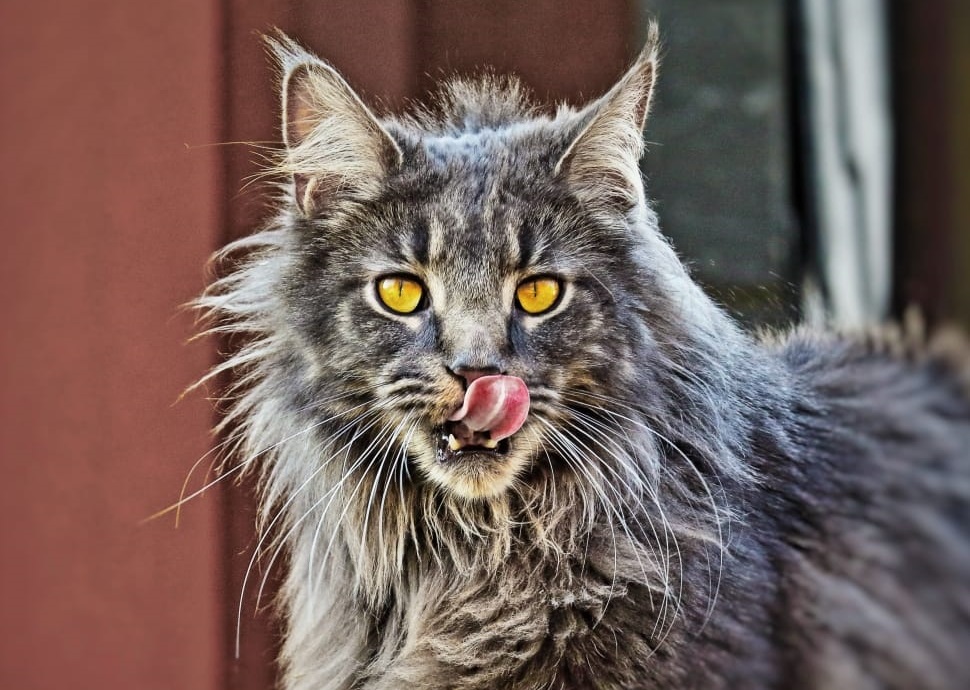Maine Coon cats are very distinctive and unique cats. Being a large and sturdy breed, it’s no surprise they possess an equally large appetite. They require a solid amount of food daily and a nourishing diet to maintain their health and support their strength and vitality.
So what do Maine Coon cats eat, and what essential nutrients should their diet include?
Maine Coons are obligate carnivores, requiring a diet rich in animal protein. They also require a high-calorie intake due to their large size and higher body mass. Their diet should be a combination of homemade raw or cooked meat and balanced and nutritionally complete cat food that is specifically formulated for their life stage (kitten, adult, or senior).
Key Takeaways
- Maine Coon cats have unique dietary needs and require a balanced and nutritionally complete diet for optimal health.
- High-quality animal protein is crucial for Maine Coon cats, and suitable protein sources should be included in their diet.
- Selecting high-quality commercial cat food brands that meet the nutritional requirements of Maine Coon cats is important.
- Homemade and raw food diets can be considered but require careful preparation and understanding of the pros and cons.
- Feeding guidelines and portions based on age and weight should be followed to ensure proper nutrition and weight management.
- Regular monitoring of weight, establishing mealtime routines, and providing fresh water are additional factors to consider when feeding Maine Coon cats.
- Overall, meeting the specific nutritional needs of Maine Coon cats is essential for their overall well-being and maintaining a healthy and happy life.
The Ideal Diet for Maine Coon Cats

Maine Coons, despite age, have an insatiable desire for food. Like many cats, they enjoy eating well but also need the calories to fuel their energy levels and maintain an active lifestyle as they enjoy hunting and playing. However, not all calories are equal, and the food they eat should contain specific nutrients that will not only fuel them with energy but also support a healthy body.
A balanced and nutritionally complete diet is vital for Maine Coons to prevent nutritional deficiencies. The ideal diet should provide all the necessary macronutrients and micronutrients in appropriate proportions. Maine Coon cats require a sufficient intake of animal-derived protein, which is essential for muscle development, tissue repair, and the proper functioning of various physiological processes.

In addition to protein, Maine Coons benefit from a well-rounded diet that includes healthy fats, vitamins, and minerals. Adequate fat intake, including omega-3 and omega-6 fatty acids, helps maintain healthy skin and coat, supports brain function, and contributes to a robust immune system. A balanced diet also ensures an adequate supply of vitamins and minerals crucial in bone strength, immune system function, and overall metabolic processes.
Proper hydration is another crucial aspect of a balanced diet for Maine Coon cats. Despite their larger size, they have a low thirst drive and seldom drink water which can lead to dehydration. Including wet cat food or adding water to their diet helps increase their moisture intake and supports kidney function, urinary tract health, and overall well-being.
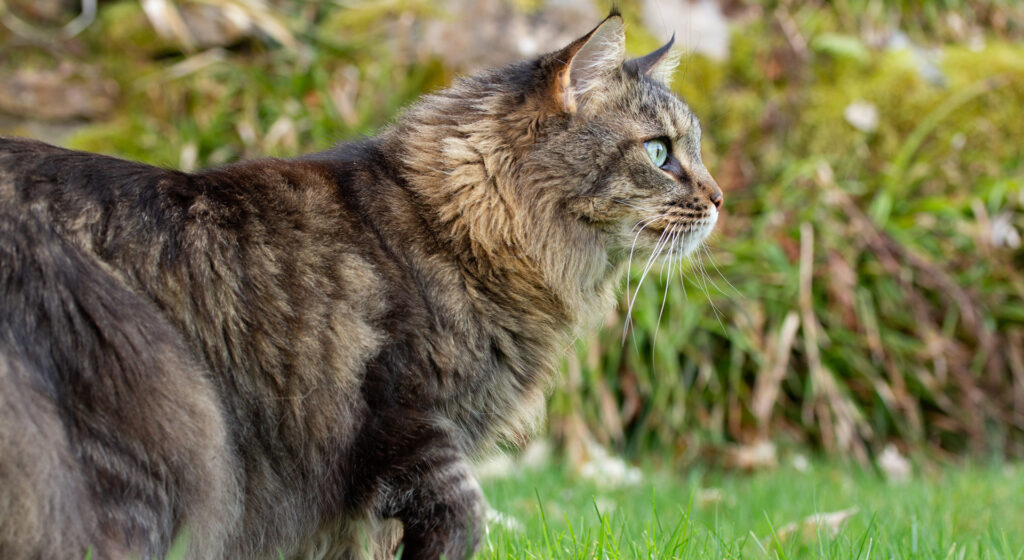
Here is a list of the essential nutrients that should be included in their meals:
- Animal Protein
- Healthy Fats and Acids:
- Omega-3
- Omega-6
- arachidonic acid
- Taurine
- Vitamins:
- Vitamin A
- Vitamin B
- Vitamin K
- Niacin
- Vitamin E & D
- Folic Acid
- Biotin
- Minerals:
- Calcium
- Phosphorus
- Potassium
- Sodium and Chloride:
- Magnesium
- Iron
- Copper
- Magnesium
- Zinc
- Iodine
- Selenium
Protein-Rich Diet for Maine Coon Cats
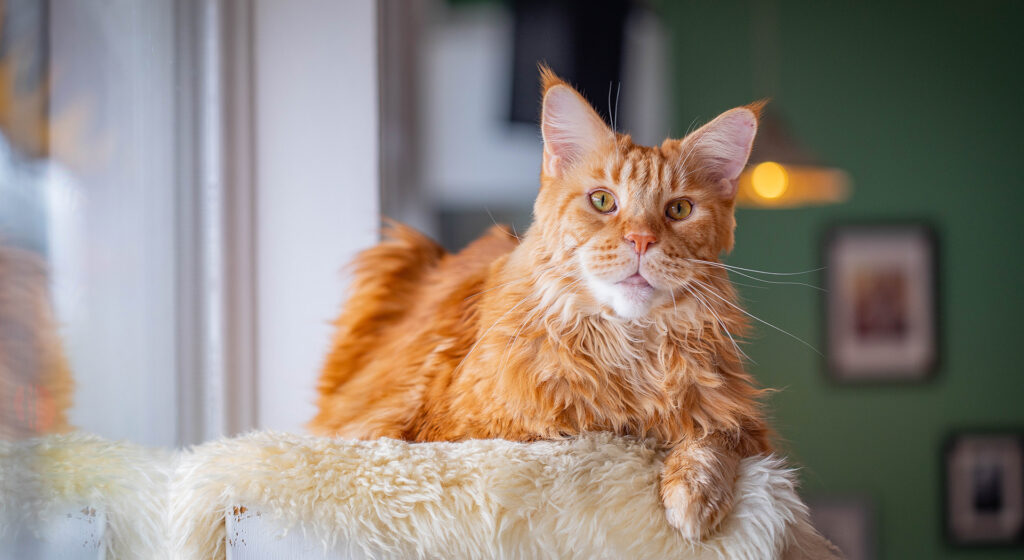
High-quality animal protein is of utmost significance in the diet of Maine Coon cats due to several reasons. Firstly, protein is a fundamental building block for various bodily functions, including muscle development, repair, and maintenance. As large and muscular cats, Maine Coons require plenty of protein intake to support their muscular body and ensure optimal muscle strength.
Several crucial components for a cat’s well-being, including specific amino acids, vitamins, and omega fatty acids, are exclusively found in meat. Essential amino acids like taurine, arginine, and cysteine play a vital role in maintaining a healthy cat. Taurine deficiency, if prolonged, can result in retinal degeneration leading to blindness, potential for heart failure, and reproductive problems such as infertility and abnormal development in kittens. Without the inclusion of meat protein in their diet, Maine Coons would be unable to acquire these essential nutrients, ultimately jeopardising their overall health and well-being.
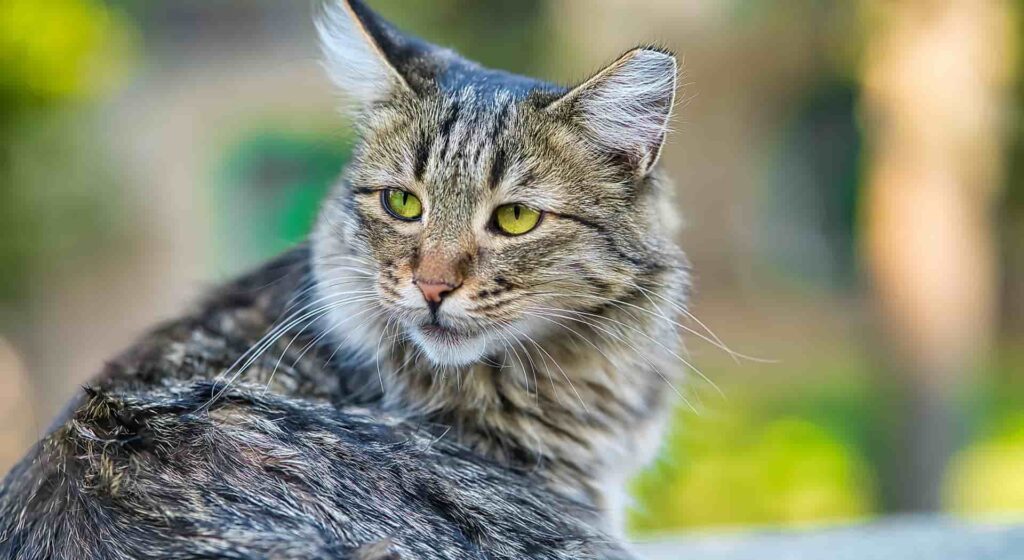
Due to their genetic predisposition, cats lack specific metabolic pathways to produce these essential nutrients endogenously. Therefore, they must obtain them through their diet, emphasising the need for a protein-rich animal-based diet to meet their unique nutritional requirement.
Moreover, protein also plays a vital role in promoting healthy skin, coat, and overall immune function. Maine Coons have thick, luxurious coats, and a protein-rich diet helps maintain the health and shine of their fur.
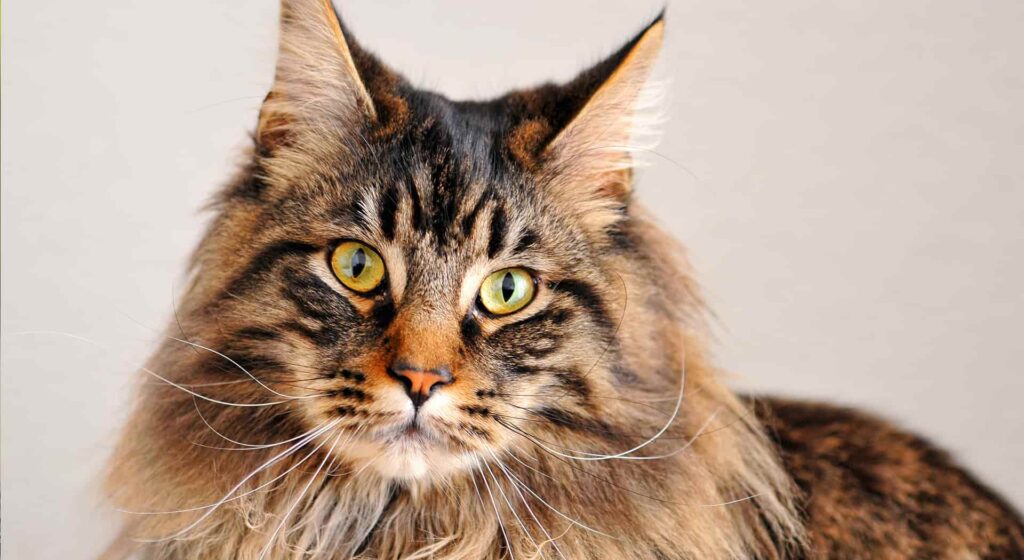
Additionally, proteins produce antibodies, enzymes, and hormones, bolstering the immune system and enabling the cat to resist infections and diseases effectively. To meet the protein requirements of Maine Coon cats, it is essential to provide them with suitable protein sources that align with their dietary needs.
Examples of protein sources suitable for Maine Coon cats include:
- Poultry: Chicken, duck, and turkey are excellent sources of lean protein and can be fed to Maine Coons in various forms, such as cooked, raw, or commercially available cat foods.
- Fish: Fish, such as salmon or tuna, is rich in high-quality protein and omega-3 fatty acids. It not only satisfies the protein needs of Maine Coons but also contributes to healthy skin and coats.
- Beef: Lean cuts of beef, such as lean ground beef or beef liver, can be included in the diet of Maine Coon cats to provide them with essential amino acids and protein.
- Organ meats: Organ meats like chicken liver or beef kidney can be included in moderate amounts as they provide a rich source of protein and essential nutrients.
- High-quality commercial cat foods: Look for cat foods specifically formulated for Maine Coon cats that contain a high percentage of animal-based proteins. These foods are designed to meet the unique nutritional needs of Maine Coons and often feature protein-rich ingredients like poultry, fish, or beef.
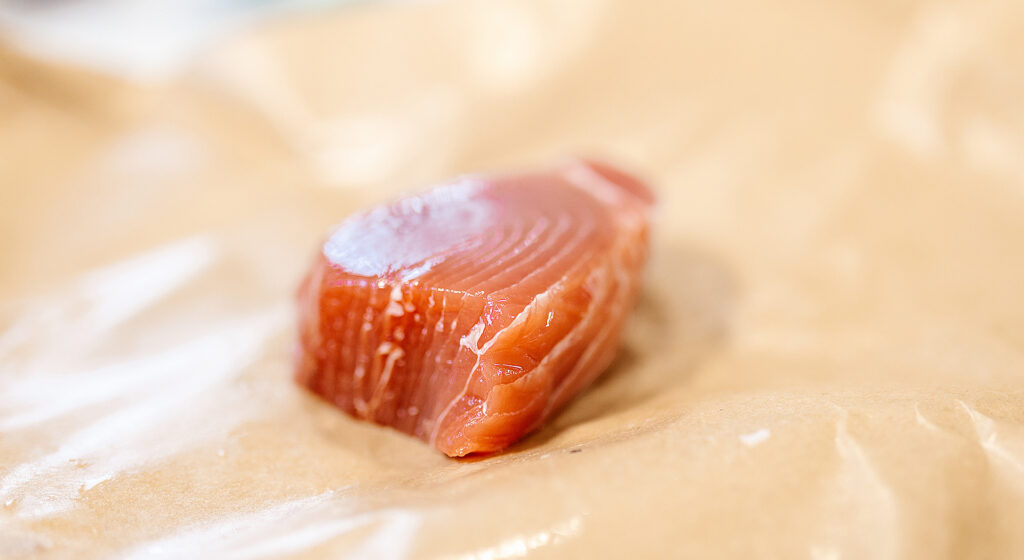
It is important to note that while small amounts of plant-based proteins can be included in a cat’s diet, the primary source of protein should come from animal sources to ensure their dietary needs are adequately met.
Unlike omnivores or herbivores, cats have evolved as obligate carnivores, and their bodies are more adapted to metabolize and derive optimal nutrition from animal-based proteins. Plant-based proteins can be more challenging for cats to digest and may not provide all the necessary amino acids in the correct balance.
Consulting with a veterinarian is recommended to determine the most appropriate diet based on the cat’s specific needs and health requirements.
Nutritional Requirements of Maine Coon Cats
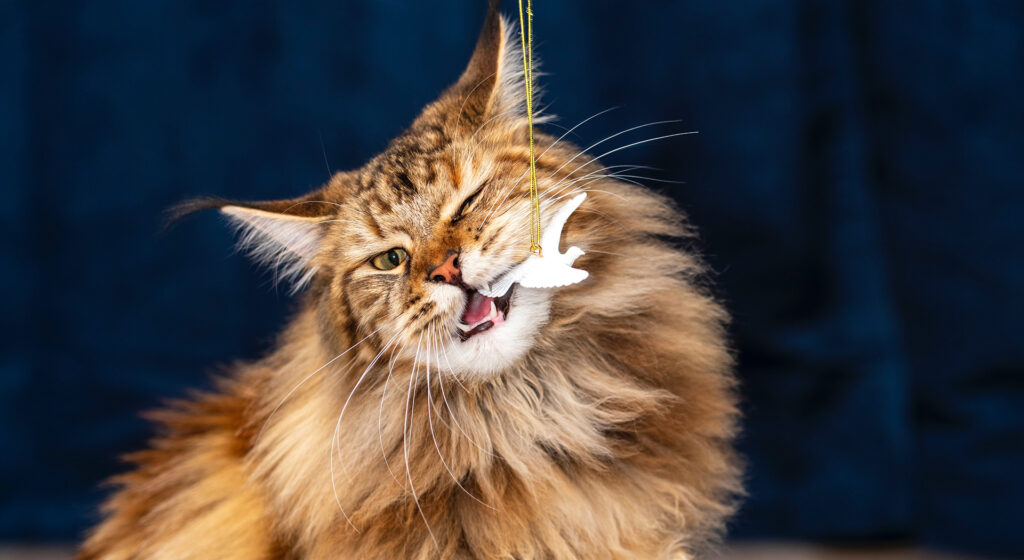
While protein is essential for Maine Coon cats, it is crucial to maintain a balanced diet overall. Moreover, a balanced diet provides essential vitamins, minerals and fatty-acids in appropriate quantities.
Vitamins
In terms of vitamins, Maine Coon cats require adequate amounts of vitamins A, D, E, and B-complex vitamins. Vitamin A is crucial for maintaining healthy vision, immune function, and tissue growth. Vitamin D regulates calcium and phosphorus metabolism, supporting bone health. Vitamin E is an antioxidant, protecting against cell damage and promoting a healthy immune system. B-complex vitamins are essential for various bodily functions, including energy metabolism, neurological health, and healthy skin and coat.
Minerals
In addition to vitamins, Maine Coon cats also require an appropriate balance of essential minerals. These include calcium, phosphorus, magnesium, potassium, and trace minerals like zinc and selenium. Calcium and phosphorus are particularly important for maintaining strong bones and teeth. Magnesium and potassium are involved in numerous physiological processes, including nerve function and muscle contraction. Adequate intake of trace minerals is essential for enzyme function, hormone production, and overall cellular health.
Fatty Acids
Omega-3 fatty acids play a crucial role in supporting the skin and coat health of Maine Coon cats. These fatty acids, specifically EPA (eicosapentaenoic acid) and DHA (docosahexaenoic acid), are abundant in fish oils. Omega-3 fatty acids provide:
- Anti-inflammatory benefits
- Promoting healthy skin
- Reducing itchiness
- Contribute to the overall health and strength of bones and joints
- Cardiovascular health benefits
- Immune System Support
- Keep the coat healthy, enhancing the shine and overall condition of the coat
Maine Coon cats, known for their beautiful, long fur, can benefit significantly from a diet that includes sufficient amounts of omega-3 fatty acids.
While omega-6 fatty acids are commonly available in food ingredients, ensuring an adequate intake of omega-3 fatty acids, usually from fish oil sources, is essential for optimal health in Maine Coon cats.
Omega-6 fatty acids are crucial for:
- Maintaining skin barrier function
- Maintaining cell structure and function
- Providing energy source for various bodily processes
- Support healthy and luscious coat
Nutritionally-Balanced Food
Like any other living organism, your cat requires a lot of micronutrients to be healthy and thrive. Moreover, to ensure that your Maine Coon cat receives the necessary vitamins and minerals, you should consider pet food options that adhere to the guidelines established by the Association of American Feed Control Officials (AAFCO). The AAFCO has developed a comprehensive standard that pet food manufacturers can follow to meet the nutritional needs of cats.
When selecting food for your Maine Coon cat, look for products that display the AAFCO’s seal of approval. It indicates that the food is formulated to provide the necessary vitamins and minerals essential for a cat’s well-being.
Feeding Guidelines and Portions for Maine Coon Cats
While growing, Maine Coons require a lot of food to sustain their energy levels and maintain healthy and strong. Moreover, even as mature cats, Maine Coons eat a lot, so paying attention to how, when, and what you feed your cat is crucial. With their healthy and large appetite, indoor Maine Coons can quickly go from hunters to chunky couch potatoes.
Many Maine Coon owners are unable to determine if their cat is overeating and if it is overweight. Since they are large, some cats can easily become overweight before it is noticeable.
Creating a proper feeding schedule and portions will take some time, however, it is advisable to follow a general chart. Additionally, monitoring your cat’s specific needs and desires, as well as consulting a veterinarian, will help create a good feeding schedule.
It is challenging to define how much is the right amount, so take a look at the chart below:
| Age (months) | Weight (lbs) | Daily Portion (grams) | Daily Calories (kcal) |
| 2-4 | 2-4 | 30-80 | 90-200 |
| 5-7 | 5-8 | 80-120 | 150-300 |
| 8-12 | 9-13 | 120-180 | 270-450 |
| 12+ | 13+ | 180–240 | 390-700 |
Please note that the portions mentioned above are approximate and can vary based on the cat’s activity level, metabolism, and overall health.
Feeding Frequency and Portion Size
Maine Coons, in general, live a very active life and have a high-energy drive. With that comes a fast metabolism and the need for larger food portions. However, every Maine Coon needs a specific diet tailored to its needs. The main factors determining the portion size and frequency are age, size, weight and activity levels. A younger, very active Maine Coon that spends a lot of time playing will require more food to fuel its adventures. As they get older, similar to people, they are more passive and spend less calories, thus should eat less.
Overall, the average caloric intake for a healthy Maine Coon is about thirty calories per pound of weight.
It is advisable to serve 2 to 3 meals per day. Spacing out their meals helps maintain consistent energy levels and prevents overeating. Free feeding is not recommended for Maine Coons as they are likely to eat more than needed which can lead to obesity. Therefore, the best thing to do is set up a feeding schedule and work around the feeding rhythm to tailor it to your cat’s needs.
Portion sizes will also vary based on the specific food you offer, the cat’s weight and needs. As a general guideline for a healthy adult cat, each meal should contain 60-80 grams of high-quality adult cat food per meal. It’s also advisable to follow the feeding guidelines provided on the specific food packaging and adjust the portions to your cat’s needs.
It’s important to note that these are general guidelines. Monitor your cat’s weight and body condition regularly and adjust the portion sizes as needed to maintain a healthy weight. Additionally, consider incorporating wet and dry food into the diet for added variety and hydration.
Feeding Guidelines for Maine Coon Kittens
Being a large breed, Maine Coon cats require a bit longer than other breeds to grow and mature. While most domestic cat breeds reach their full growth and development within the first year of life, Maine Coons continue to mature for a more extended period. It typically takes around 3 years for Maine Coons to reach their full adult size and physical development. Therefore, it is important to feed them appropriately during the kitten phase to ensure healthy development.
Maine Coon kittens require a lot of energy to grow and develop. They are also very active and need to fuel their bodies to hunt and play. This means they will require a lot of kitten food throughout the day. However, to properly feed the kittens, the food needs to be divided into several smaller portions. Their stomachs are still undeveloped, and they have a tiny digestive tract.
Too much food can cause gastrointestinal issues, and a shortage of food and nutrients can interrupt their proper development. To define the amounts and feeding schedule, take a look at the chart below:
| Age (weeks) | Daily Meals | Meal Frequency | Daily Portion (grams) |
| 4-8 | 4 | Every 4 hours | 20-30 |
| 8-12 | 3 | Every 6 hours | 30-40 |
| 12-16 | 3 | Every 8 hours | 40-50 |
| 16-20 | 2 | Every 12 hours | 50-60 |
| 20+ | 2 | Every 12 hours | 60-70 |
Please note that this feeding chart serves as a general guideline. The portions may vary depending on the individual kitten’s growth, activity level, and overall health. It’s essential to consult with a veterinarian for precise feeding recommendations tailored to your Maine Coon kitten’s specific needs.
Feeding Frequency
- Up to 8 weeks old: Maine Coon kittens have small stomachs and need frequent feedings. Aim for 4-6 meals per day, providing them with a steady supply of nutrients.
- 8 to 12 weeks old: Reduce the frequency slightly to 3-4 meals per day as their stomach capacity increases.
- 12 to 24 weeks old: Continue with 3-4 meals per day to support their growth and energy requirements.
- 24 weeks and older: Gradually transition to 2-3 meals per day, spacing them out evenly throughout the day.
Meal Size
The amount of food to feed a Maine Coon kitten depends on factors such as age, weight, and activity level. As a general guideline, Maine Coon kittens should be offered about 30-40 grams of high-quality kitten food per meal. Follow the feeding guidelines provided on the food packaging as a starting point and adjust the portion size based on the individual kitten’s needs and growth rate.
Pay attention to your kitten’s appetite and body condition. Adjust the portion size if they are consistently leaving food or showing signs of being hungry after meals. Monitor their growth and consult with a veterinarian for specific recommendations on portion sizes based on their weight and age.
Can you overfeed a Maine Coon kitten?
Yes, it is possible to overfeed a Maine Coon kitten. This breed is prone to obesity, and humans often feed them excessively, thinking they need more food due to their size. Overfeeding can lead to excessive weight gain and serious health issues. Maine Coon kittens have specific dietary requirements, and feeding them more than necessary can lead to obesity and related health problems. It’s important to provide them with the appropriate portion sizes and stimulate them to be active.
How long should Maine Coons eat kitten food?
Maine Coons should generally eat kitten food until they reach approximately 12 months of age. Kitten food is specially formulated to meet their higher energy and nutrient needs for growth and development. Transitioning to adult cat food is recommended as they approach their first birthday. Consult with a veterinarian to determine the appropriate time to switch their diet. The transition process should be gradual, mixing increasing amounts of adult cat food with decreasing amounts of kitten food for about one to two weeks.
What should Maine Coon kittens eat?
Maine Coon kittens should be fed high-quality commercial kitten food specifically formulated for their nutritional needs. Look for kitten foods that provide a balanced blend of proteins, fats, vitamins, and minerals. The dominant ingredient should ideally be a high-quality animal protein source. It’s also beneficial to choose kitten food that contains essential nutrients like DHA (docosahexaenoic acid) to support brain and vision development.
Food that Maine Coon Cats Should Avoid
As we already discussed in this article, cats are obligate carnivores and they need large amounts of animal protein and fat. Thus, their diet should mainly be comprised of meat. However, people often feed their cats with food they like to eat, which can lead to serious health problems. Given cats do not tolerate some of these foods, they can suffer organ damage. Let’s take a look at the different foods that are not safe for Maine Coons.
- Milk and Dairy Products: While cats may enjoy the taste of milk, many adult cats are lactose intolerant and cannot properly digest lactose, leading to digestive upset and diarrhoea. It’s best to avoid giving your cat milk, cheese, or other dairy products.
- Onions and Garlic: Onions and garlic, as well as leek and chives, contain thiosulphates and disulfides, compounds that are toxic to cats. Whether raw, cooked, or powdered, these compounds can damage red blood cells if ingested, leading to anaemia. These ingredients are commonly found in many human dishes and should be kept away from cats.
- Chocolate: Chocolate contains theobromine, which is toxic to cats. Chocolate (cocoa) also contains caffeine; if ingested it can cause symptoms like vomiting, diarrhoea, rapid breathing, increased heart rate, and even seizures. It’s crucial to ensure cats have no access to chocolate products.
- Caffeine: Foods and beverages containing caffeine, such as coffee, tea, energy drinks, harm cats. Caffeine can affect their nervous system and cardiovascular health, potentially leading to restlessness, rapid breathing, increased heart rate, tremors, and even seizures.
- Grapes and Raisins: Grapes and raisins can be toxic to cats, potentially causing kidney damage. Even small amounts can lead to symptoms like vomiting, lethargy, decreased appetite, and increased thirst and urination.
- Avocado: Avocado contains a substance called persin, which can be toxic to cats. It can cause gastrointestinal upset, including vomiting and diarrhoea. The pit and skin of the avocado can also pose a choking hazard or lead to intestinal blockages if ingested.
- Alcohol: It should go without saying, but cats should never be given alcohol. Even a small amount can be extremely dangerous and potentially fatal. Keep all alcoholic beverages out of reach of your cat.
- High-sodium Foods: Cats are more sensitive to salt than humans, and excessive sodium intake can lead to dehydration and electrolyte imbalances. Avoid feeding them highly salted foods like processed meats.
- Excessive Carbohydrates: Cats are obligate carnivores, meaning their bodies are primarily designed to process animal protein. While small amounts of carbohydrates are usually tolerated, a diet high in carbohydrates can lead to obesity and other health issues.
Maine Coons should be fed a balanced diet focusing on quality animal protein. Additionally, cat owners should ensure their cats can’t access any human food that is potential harm to prevent food-related issues.
Common Food Allergies in Maine Coon Cats
While there are no specific food allergens exclusive to Maine Coon cats, they may be prone to certain allergies that are more commonly seen in the breed.
- Main Coons may develop allergies to specific protein sources commonly found in cat food, such as chicken, beef, fish, or dairy products. Beef is the most common allergen for this breed.
- Grains and gluten extracted from grains as well as rice and soya, are often found as filler ingredients in commercial cat food. As obligate carnivores, Maine Coons may develop sensitivities or allergies to grains like wheat, corn, or soy.
- Additives, colours, and preservatives commonly used in commercial cat foods can trigger allergic reactions in some individuals. Opting for natural and minimally processed cat foods can help reduce the risk of exposure to such additives.
- Maine Coons commonly develop allergies or intolerance to dairy products. While Maine Coon kittens can initially tolerate milk after being weaned off, their ability to digest the proteins and sugar in milk diminishes over time. Despite this, cats still enjoy the taste of milk, leading some manufacturers to use it in cat food to enhance the taste.
When dealing with food allergies elimination diet is recommended. It involves feeding a limited ingredient diet with novel protein and carbohydrate sources to identify the allergenic triggers. Additionally, it is advisable to switch to a hypoallergenic diet or create homemade meals that meet your Maine Coon’s nutritional requirements while avoiding allergens.
Commercial Cat Food Options for Maine Coon Cats
When it comes to a healthy and well-balanced diet for a Maine Coon cat, veterinary professionals and experts often recommend that owners of Maine Coon cats provide a balanced combination of dry and wet food during meal times. The combination of different foods allows them to enjoy the benefits of each type, including better weight management, improved hydration, and a smoother digestive system.
Below is an overview of all the commercial cat food options available:
- Dry Kibble: Dry cat food, also known as kibble, is a popular and convenient option. It consists of dry, bite-sized pieces that can be used for a longer period without refrigeration. Dry kibble is typically formulated to provide balanced nutrition for cats and may help promote dental health by reducing plaque and tartar buildup. It often contains a combination of proteins, carbohydrates, fats, vitamins, and minerals.
- Wet Food: Wet cat food comes in cans or pouches and contains higher moisture content compared to dry kibble. It has a soft texture and is often more palatable to cats due to its rich aroma and flavour. Wet food provides hydration and can benefit cats with difficulty drinking enough water. It is generally made with high-quality meat, fish, or poultry and offers a good source of protein and essential nutrients.
- Semi-Moist Food: Semi-moist cat food is a middle ground between dry kibble and wet food. It has a soft, chewy texture and higher moisture content than dry food but is not as wet as canned food. Semi-moist food is often shaped into small, bite-sized pieces and is known for its convenience and palatability. However, it typically contains higher levels of artificial additives and preservatives.
- Raw Food: Raw food, also known as a raw or biologically appropriate raw diet (BARF), consists of uncooked, minimally processed ingredients like raw meat, organs, bones, and sometimes fruits and vegetables. Advocates of raw food diets for cats argue that it closely resembles their natural diet in the wild and provides optimal nutrition. However, it requires careful handling to minimize the risk of bacterial contamination, and a proper balance of nutrients is crucial to avoid deficiencies or imbalances. This food comes as frozen, freeze-dried and pasteurized to ensure it is safe to serve and free of harmful bacteria.
- Veterinary Prescription Diets: Veterinary prescription diets are formulated to address specific health conditions, such as urinary tract issues, gastrointestinal problems, allergies, or weight management. Veterinarians typically recommend these diets to manage or treat certain medical conditions in cats. They are available in both dry and wet forms and require a prescription from a veterinarian.
A Guide for Selecting a High-quality Cat Food
When selecting high-quality cat food for Maine Coon cats, there are several factors you should consider to ensure they receive the necessary nutrition and avoid harmful additives. With so many commercial brands available, it can be hard to decide the best option.
First and foremost, the ingredient list will tell you if there are high-quality animal protein sources, such as chicken, turkey, fish, or beef, as the main ingredients. Avoid products that list vague terms like “meat by-products” or “animal digest.” Ideally, the protein source should be named and easily identifiable. On the contrary, avoid brands that comprise the protein count with plant-based sources. As discussed before in this article, this type of protein is not what your Maine Coon needs in order to thrive.
Quality cat food generally has a small number of ingredients; each is identifiable and not hidden behind terms you can’t understand. Moreover, it should provide a balanced combination of proteins, fats, carbohydrates, vitamins, and minerals. Look for products that meet the nutritional standards established by reputable organizations, such as the Association of American Feed Control Officials (AAFCO) or other relevant regulatory bodies in your country.
Avoid products with artificial additives; these are artificial colours, flavours, or preservatives. These and similar additives may have potential health risks, while they do not provide any nutritional value. High-quality cat food does not contain grains, cereals, or vegetables, which are difficult for cats to metabolize. These unnecessary ingredients are not required and do not enhance the nutritional value of the food.
If there is an analysis of the percentage of the nutritional group and values, it preferably should have the following general composition:
- Animal Protein > 50% calories
- Animal Fat – moderate fat (~20-45% calories)
- Carbs – very low (1-2% calories)
- water-rich with a maximum water content of 78%
Homemade and Raw Feeding for Maine Coon Cats
Whether raw and homemade diets are safe for your Maine Coon sparks an ongoing debate among cat owners and vet specialists. Supporters of raw and homemade diets argue that these options closely mimic a cat’s natural diet and can provide numerous health benefits.
This is partially true, however, both options have pros and cons that must be considered.
Pros of Homemade Diets:
- Ingredient Control: Making homemade cat food gives you complete control over the ingredients. You can tailor the diet to your Maine Coon according to its specific needs or dietary restrictions.
- Freshness and Quality: You are in control of choosing the ingredients, and you can always opt for fresh and high-quality ingredients in each meal. You know exactly what goes into each meal and have peace of mind knowing the quality and safety of the ingredients.
- Variety: Homemade diets offer the opportunity to provide a variety of proteins and flavours, which can be appealing to picky eaters and keep your cat satisfied and happy.
Cons of Homemade Diets:
- Nutritional Imbalance: Achieving a balanced and complete nutritional profile in homemade diets can be challenging. Cats have specific dietary requirements, and it is not easy to meet them accurately without professional guidance.
- Time and Effort: Preparing homemade cat food requires time, effort, and knowledge of feline nutrition. It involves sourcing ingredients, meal planning, and proper food handling practices.
- Cost: Homemade diets can be more expensive than commercial cat food, especially if you opt for high-quality ingredients.
- Risk of Contamination: Improper handling or preparation of homemade cat food can lead to bacterial contamination, posing a threat to both cats and humans.
Pros of Raw Food Diets:
- Nutritional Benefits: Raw food diets aim to mimic a cat’s natural diet, which primarily consists of raw meat, organs, and bones. This can provide a natural source of nutrients and may contribute to overall health.
- Improved Coat and Skin: Some advocates of raw food diets claim that cats may experience shinier coats and healthier skin.
- Reduced Fillers and Additives: Raw food diets exclude grains, fillers, and artificial additives commonly found in commercial cat food.
Cons of Raw Food Diets:
- Bacterial Contamination: Raw meat poses a higher risk of bacterial contamination, such as Salmonella or E. coli. Proper food handling and hygiene practices are crucial to minimize this risk.
- Nutritional Imbalance: Creating a nutritionally balanced raw food diet requires meticulous planning and knowledge of feline dietary requirements. Inadequate nutrient balance can lead to deficiencies or imbalances.
- Time and Convenience: Raw food diets require time for meal preparation, ingredient sourcing, and potential meal rotation to ensure variety and nutritional balance.
- Cost: Raw food diets can be expensive, as high-quality raw ingredients can come at a premium price.
Common risks that the raw Maine Coons diet poses are bacterial contamination, nutritional imbalance leading to malnourishment, and parasite infestation. Intestinal parasites can also induce digestive upsets, although a raw diet alone can lead to digestive issues such as diarrhoea and vomiting.
How to Safely Prepare Homemade and Raw Meals
When it comes to feeding your cat raw food, the most important thing to note is, though it more closely resembles their diet in nature, meat processed by humans is more likely to contain pathogens like E. coli. Moreover, the frozen or fresh meat is days and maybe weeks old before it is purchased in the store. While the raw food they eat in nature is recently caught and eaten immediately while still fresh. It is advisable to obtain raw meat from locally-sourced farms with the lowest risk of containing many pathogens.
Feeding pre-ground meat in raw form bought from the supermarket is not the best option. It is safer and more hygienic to buy whole cuts of meat and thoroughly rinse it before grinding. You can decide to give your Maine Coon the raw, freshly ground meat or bake the meat to ensure it is free of pathogens as a safer option.
Bacteria reside on the surface of the whole meat, not deep in the tissues. Therefore, the best way to serve homemade meat is to precook it until the surfaces are cooked, or around 30% of the meat is cooked. Grind it after and serve or bake until it is done. You can always prepare larger amounts of food and instantly freeze it to use later.
It is recommended to bake the meat as boiling is considered the worst way to cook meat in terms of nutrient loss.
To make sure this type of food is nutritionally sufficient, you should also add bones, skin, and liver. Moreover, adding water and essential supplements like vitamins and fish oil are also recommended to achieve a nutritionally balanced meal.
Maine Coons can also eat eggs as part of their diet. Eggs are a good source of protein and contain amino acids, vitamins, and minerals. It’s important to cook them thoroughly, and you can mix them in home-cooked meals to enhance their nutritional value. Start by introducing a small amount of cooked egg to your cat’s diet and observe their response. If your cat tolerates eggs well and enjoys them, they can be included as an occasional addition to their balanced diet.
The most important thing to note if you are mainly feeding your Maine Coon raw meat or homemade meals is the lack of essential nutrients. Feeding them meat only is not sufficient. You must also include bone content and organs as well as supplements to make up the needed essential vitamins.
Note that it is always best to consult with a veterinarian or a veterinary nutritionist before starting a homemade or raw food diet for your Maine Coon cat. They can provide guidance specific to your cat’s nutritional needs, health conditions, and any potential dietary restrictions.
Additional Tips for Feeding Maine Coon Cats
Establishing a consistent mealtime routine is important for Maine Coon cats to maintain a healthy diet. Set regular feeding times and stick to them as closely as possible. This helps to regulate the cat’s appetite and digestion. Adult Maine Coons should have two or three meals daily (depending on the weight and caloric needs), while kittens require more frequent meals. Following a routine, you can monitor the cat’s eating habits and ensure they receive enough food and adequate nutrition.
Monitoring your Maine Coon’s weight is crucial in maintaining their overall health. Regular weigh-ins can help you track any fluctuations and make necessary adjustments to its diet. If you notice your Maine Coon gaining or losing weight unexpectedly, consult your veterinarian to determine the appropriate dietary changes.
It is generally recommended to provide a balanced combination of commercial cat food and homemade or raw food. Commercial cat food, whether dry kibble or wet food, often contains the essential nutrients that Maine Coons need. Look for high-quality brands specifically formulated for the nutritional requirements of Maine Coon cats.
However, incorporating homemade or raw food also benefits your Maine Coon’s diet. Homemade and raw food offers a more natural and species-appropriate approach, as it closely resembles the diet of their wild ancestors. When feeding raw food, rabbit, fish, or poultry is recommended. These are easily digestible for cats and have lower fat content, which is more appropriate for a cat’s diet.
Furthermore, introduce any dietary changes gradually to avoid digestive upset, and always prioritize the overall nutritional balance and quality of the food you provide for your Maine Coon. Regularly assessing their body condition and consulting with professionals will help ensure that their diet remains optimal.
Hydration and Treats
Maine Coons, like all cat breeds, require access to clean and fresh water at all times. Water is crucial for many bodily functions, including digestion, circulation, and temperature regulation. Hydration is especially important for Maine Coons due to their large size and potential for increased water needs. Ensure your cat’s water bowl is clean, filled with fresh water, and easily accessible throughout the day. Regularly monitor the water level and refill it as needed to encourage proper hydration.
Cats tend to have a low desire to drink water which can pose a risk of dehydration. While water can always be obtained through food, to encourage them to drink more water, change the location of the water stations to make them curious and stimulate them to drink more water.
On the other hand, it’s important to offer treats in moderation and choose them wisely. Look for high-quality, nutritious treats made from wholesome ingredients designed to meet the nutritional needs of cats. Treats should be given occasionally to avoid excessive calorie intake, which can contribute to weight gain and potential health issues. It’s always a good idea to check with your veterinarian for recommendations on suitable treats and proper portion sizes based on your cat’s individual needs.
Treats can serve as a way to reward and bond with your Maine Coon cat. However, Remember that treats should never replace a balanced and complete diet. Maine Coon cats should primarily rely on their regular meals to meet their nutritional requirements. Treats should be seen as occasional additions to the diet, not a significant portion of their food intake.
Conclusion
Like any human or animal, Maine Coons can thrive if they are fed a diet highly optimized for their needs. These magnificent felines are big and strong, thus have unique dietary requirements that must be met to support their specific needs. Moreover, be prepared to satisfy a hearty appetite and resist the cutest and frequent manipulations to earn a treat!
In conclusion, their diet should include high-quality animal protein sources, such as meat and fish, providing the amino acids for their muscular build and energy requirements. Vitamins, minerals, and fatty acids are vital for their overall health and vitality.
A well-balanced diet supports their growth, development, and immune system while also promoting healthy skin and a shiny coat. Proper nutrition contributes to their strong bones and joints, as well as their overall energy levels and activity.
Regularly monitoring their weight and overall body condition is essential to make any necessary adjustments to their diet. By providing them with the ideal diet, Maine Coon cat owners can ensure their beloved companions thrive and enjoy a happy and fulfilling life.
To conclude, consider turning your Maine Coon cats into Instagram influencers to support their hearty appetite earning their way to gourmet delights!
